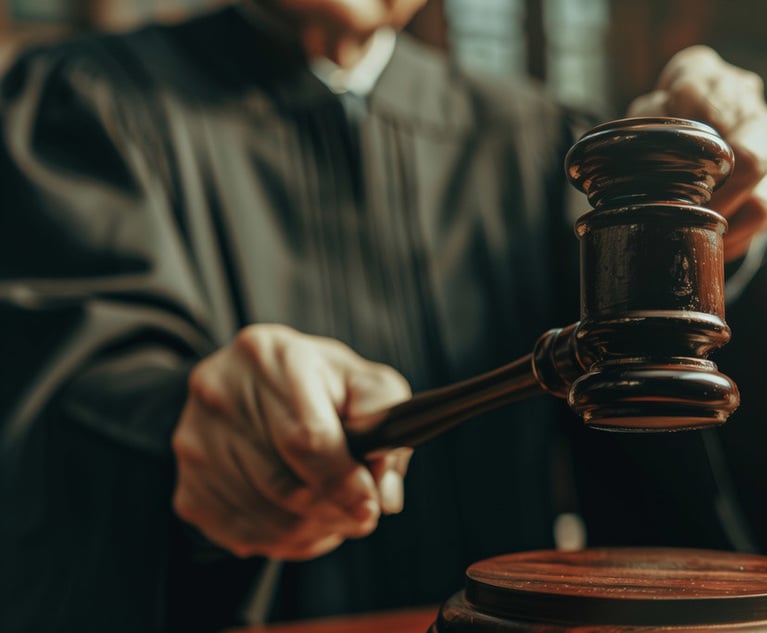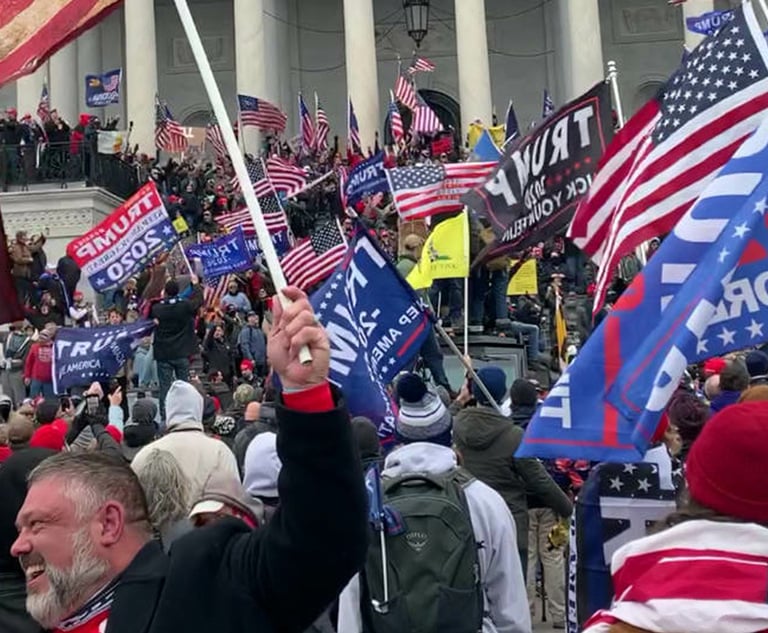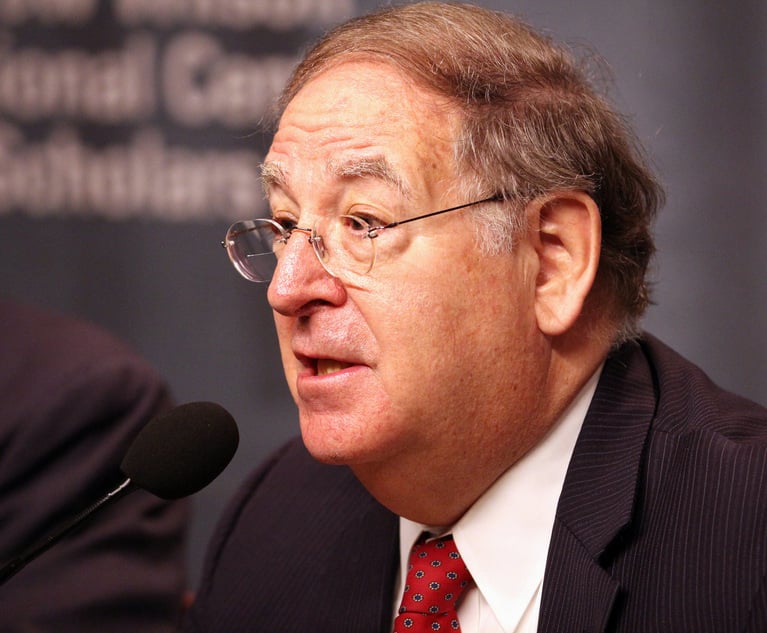 Justice John Marshall Harlan, Supreme Court. Credit: Brady-Handy photograph collection/Library of Congress
Justice John Marshall Harlan, Supreme Court. Credit: Brady-Handy photograph collection/Library of Congress 'The Marble Palace Blog': Should It Become the Harlan Palace?
Is it time to give the Supreme Court building a name? And would John Marshall Harlan be the right name?
November 01, 2021 at 12:10 PM
6 minute read
I launched this blog last month with the name of "The Marble Palace" because that is a nickname for the Supreme Court building. All of a sudden, now comes someone who wants to change the name of the majestic building altogether, naming it after Justice John Marshall Harlan, who served at the court from 1877 to 1911. (Not to be confused with his grandson John Marshall Harlan II, who was a justice from 1955 to 1971.)
The instigator is Sarah Isgur, a Harvard Law School grad who clerked on the U.S. Court of Appeals for the Fifth Circuit. She was a Justice Department spokeswoman during the Trump administration.
In a Politico essay, Isgur wrote that it was time for naming the high court building. "The building's lack of identity can sometimes seem to mirror the opaqueness of the institution itself. Both the edifice, and the court it houses, need a story to help Americans make sense of them," she said.
The pinnacle of Harlan's story was his role as the sole dissenter in Plessy v. Ferguson, the 1896 race ruling that approved the principle of separate but equal. Harlan said no: "Our constitution is color-blind, and neither knows nor tolerates classes among citizens."
But as Isgur acknowledged, Harlan did not always embrace racial equality. Harlan had opposed "both Lincoln's Emancipation Proclamation and the 13th Amendment before becoming the greatest defender of racial equality in court history," she wrote. Harlan also disparaged what he called "the Chinese race" in his Plessy dissent. But still, Isgur said, the court should be named after Harlan not in spite of those failings "but because of it. He, of all the justices in U.S. history, shows how an intense and unfaltering faith in the Constitution can chart a path to enlightenment."
Asked about Isgur's idea, Josh Blackman, founder of the Harlan Institute, said, "I am skeptical the court will ever change its name, but of all the justices we should venerate, Justice John Marshall Harlan I tops any list."
To get another take on Isgur's notion, I contacted Peter Canellos, author of a highly acclaimed biography of Harlan published this year, named "The Great Dissenter: The Story of John Marshall Harlan, America's Judicial Hero." He is also an editor at Politico. Here's our conversation, somewhat condensed:
Knowing what you know about Justice Harlan, do you think the Supreme Court building should be named after him?
I thought Sarah Isgur made a fine case. Harlan himself would, of course, happily defer to the man he was named for, Chief Justice John Marshall. Many would share that opinion. The best reason to choose Harlan over Marshall would be his connection to the nation's racial crucible. If the historic challenge of American democracy has been to bring people of different races and backgrounds under the equal protection of its laws, Harlan occupies a unique position in that enduring struggle. At the start of the segregation era, the very darkest period in Supreme Court history, he alone kept true to the spirit of the Constitution. In doing so, he inspired others, including the leaders of the 20th century civil rights movement.
Given that we are in a period when monuments and streets are banished because of their racist pasts, could Harlan survive as a name for the court? His comments in Plessy about the Chinese race, as well as his early background opposing emancipation and the 13th Amendment might make his naming impossible.
I think it's important to recognize that people can be honored for their great deeds and the impact they had on American history without endorsing every aspect of their lives and careers. I think Harlan's record on civil rights is extraordinary. In dissent, he stood up for the equal rights of African Americans, Native Americans, and people in the Philippines, Hawaii and Puerto Rico during America's brush with imperialism. The Chinese cases were different because, under the strictures imposed by Congress, Chinese workers were not citizens and remained subjects of the Chinese emperor. Otherwise, his record is pretty admirable to modern eyes. But it's not without blemishes. I think the same would be true of any other legal figures who'd be outfitted for monuments.
How do you explain the fact that Harlan has been praised by Neil Gorsuch and other conservatives, as well as Ruth Bader Ginsburg and Thurgood Marshall?
Today's conservatives see Harlan's career as a vindication of their belief in adhering to the original intent and plain meaning of the Constitution. When Harlan stood up for equal protection under the law, he was doing just that. So, too, did he defend the principle of judicial restraint in Lochner and other cases. Liberals admire the fact that Harlan was intensely concerned with the impact that Supreme Court cases would have on real people, and on the trajectory of the country. He understood there was no recourse when the Supreme Court got it wrong, except to appeal to future generations through dissent. His opinions often expressed sympathy for victims of court decisions he felt went the wrong way.
I hope that today's liberals and conservatives can grow to appreciate what each other admires in Harlan. Original intent and plain meaning are powerful tools of interpretation. At the same time, jurists should be mindful of the practical effects of their decisions.
What was Harlan like as a justice? Did he get along with his brethren and his clerks?
Harlan loved serving on the court, and was popular in the D.C. bar and as a teacher at Washington's Columbian University [now George Washington]. He had a loyalty and even fondness for his brethren, but that didn't stop him from disagreeing passionately with certain of them. Stephen Field was once the recipient of some angry finger-pointing from the bench, and Harlan's relationship with Holmes was complicated. They had some mutual respect, and fellowship as Civil War veterans, but also seemed to recognize themselves as judicial opposites. Holmes was known for his doctrinal brilliance, Harlan for his firm sense of justice. The modern clerk system wasn't yet in place when Harlan served, but he had a very close relationship with his Supreme Court page, an African American man named James Jackson. Jackson was at Harlan's side, along with his family members, when he died.
NOT FOR REPRINT
© 2025 ALM Global, LLC, All Rights Reserved. Request academic re-use from www.copyright.com. All other uses, submit a request to [email protected]. For more information visit Asset & Logo Licensing.
You Might Like
View All
Who Are the Judges Assigned to Challenges to Trump’s Birthright Citizenship Order?

‘Undermines the Rule of Law’: Retired US Judges Condemn Trump’s Jan. 6 Pardons

'If the Job Is Better, You Get Better': Chief District Judge Discusses Overcoming Negative Perceptions

'Thoughtful Jurist': Maryland US District Senior Judge Messitte Dies After Short Illness
4 minute readTrending Stories
- 1Patent Pending ... and Pending ... and Pending? Brace Yourself for Longer Waits
- 2Indian Law Firm Cyril Amarchand Rolls Out AI Strategy, Adopts Suite of AI Tools
- 3Which Legal Tech Jobs Are on the Rise, and Which Aren't, with Jared Coseglia
- 4Absent Explicit Agreement, Court Rejects Unilateral Responsiveness Redaction of Text Messages
- 5SEC Whistleblower Program: What to Expect Under the Trump Administration
Who Got The Work
J. Brugh Lower of Gibbons has entered an appearance for industrial equipment supplier Devco Corporation in a pending trademark infringement lawsuit. The suit, accusing the defendant of selling knock-off Graco products, was filed Dec. 18 in New Jersey District Court by Rivkin Radler on behalf of Graco Inc. and Graco Minnesota. The case, assigned to U.S. District Judge Zahid N. Quraishi, is 3:24-cv-11294, Graco Inc. et al v. Devco Corporation.
Who Got The Work
Rebecca Maller-Stein and Kent A. Yalowitz of Arnold & Porter Kaye Scholer have entered their appearances for Hanaco Venture Capital and its executives, Lior Prosor and David Frankel, in a pending securities lawsuit. The action, filed on Dec. 24 in New York Southern District Court by Zell, Aron & Co. on behalf of Goldeneye Advisors, accuses the defendants of negligently and fraudulently managing the plaintiff's $1 million investment. The case, assigned to U.S. District Judge Vernon S. Broderick, is 1:24-cv-09918, Goldeneye Advisors, LLC v. Hanaco Venture Capital, Ltd. et al.
Who Got The Work
Attorneys from A&O Shearman has stepped in as defense counsel for Toronto-Dominion Bank and other defendants in a pending securities class action. The suit, filed Dec. 11 in New York Southern District Court by Bleichmar Fonti & Auld, accuses the defendants of concealing the bank's 'pervasive' deficiencies in regards to its compliance with the Bank Secrecy Act and the quality of its anti-money laundering controls. The case, assigned to U.S. District Judge Arun Subramanian, is 1:24-cv-09445, Gonzalez v. The Toronto-Dominion Bank et al.
Who Got The Work
Crown Castle International, a Pennsylvania company providing shared communications infrastructure, has turned to Luke D. Wolf of Gordon Rees Scully Mansukhani to fend off a pending breach-of-contract lawsuit. The court action, filed Nov. 25 in Michigan Eastern District Court by Hooper Hathaway PC on behalf of The Town Residences LLC, accuses Crown Castle of failing to transfer approximately $30,000 in utility payments from T-Mobile in breach of a roof-top lease and assignment agreement. The case, assigned to U.S. District Judge Susan K. Declercq, is 2:24-cv-13131, The Town Residences LLC v. T-Mobile US, Inc. et al.
Who Got The Work
Wilfred P. Coronato and Daniel M. Schwartz of McCarter & English have stepped in as defense counsel to Electrolux Home Products Inc. in a pending product liability lawsuit. The court action, filed Nov. 26 in New York Eastern District Court by Poulos Lopiccolo PC and Nagel Rice LLP on behalf of David Stern, alleges that the defendant's refrigerators’ drawers and shelving repeatedly break and fall apart within months after purchase. The case, assigned to U.S. District Judge Joan M. Azrack, is 2:24-cv-08204, Stern v. Electrolux Home Products, Inc.
Featured Firms
Law Offices of Gary Martin Hays & Associates, P.C.
(470) 294-1674
Law Offices of Mark E. Salomone
(857) 444-6468
Smith & Hassler
(713) 739-1250








